Latin America and the Caribbean
Prime Minister Abe’s Visit to Mexico
July 27, 2014
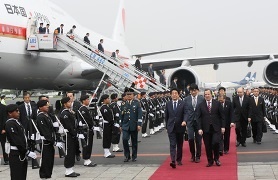 Photo: Cabinet Public Relations Office
Photo: Cabinet Public Relations Office
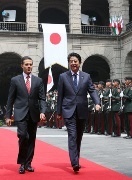 Welcoming ceremony
Photo: Cabinet Public Relations Office
Welcoming ceremony
Photo: Cabinet Public Relations Office
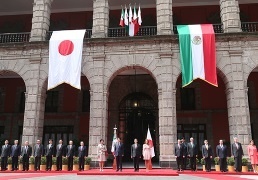 Welcoming ceremony
Photo: Cabinet Public Relations Office
Welcoming ceremony
Photo: Cabinet Public Relations Office
Prime Minister Shinzo Abe paid a visit to Mexico and participated in events in Mexico City from July 25 to 27. The overview of the outcomes is as follows. (This is the first time that a Japanese Prime Minister has visited Mexico in a bilateral context in 10 years, since Prime Minister Junichiro Koizumi’s visit in 2004).
I. Overview
1.Itinerary
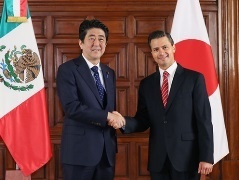 Japan-Mexico summit meeting
Japan-Mexico summit meetingPhoto: Cabinet Public Relations Office
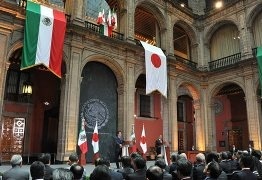 Joint press conference
Joint press conferencePhoto: Cabinet Public Relations Office
Friday, July 25
Wreath laying ceremony at the Altar of the Fatherland (Heroic Cadets Memorial)
Welcoming ceremony
Japan-Mexico summit meeting
Courtesy call on President by Japanese business representatives
Joint press conference
Luncheon hosted by President Peña Nieto
Japan-Mexico Businessmen’s Joint Committee Meeting
Saturday, July 26
Visit to National Museum of Anthropology
Visit to Teotihuacan site
Meeting with executives of Japanese descent (Japan-Mexico Association members)
Reception commemorating Prime Minister Abe’s visit to Mexico
2. Wreath laying ceremony at the Altar of the Fatherland (Heroic Cadets Memorial)
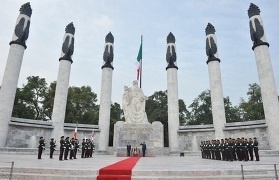 Photo: Cabinet Public Relations Office
Photo: Cabinet Public Relations Office
On Friday, July 25, Prime Minister Abe and his wife laid a wreath at the Altar of the Fatherland (Heroic Cadets Memorial) in Chapultepec Park, Mexico City.
3. Japan-Mexico Summit Meeting
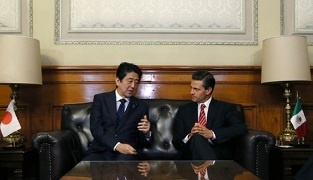 Small-Group Meeting
Small-Group MeetingPhoto: Cabinet Public Relations Office
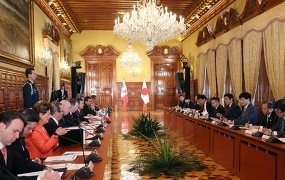 Expanded Meeting
Expanded MeetingPhoto: Cabinet Public Relations Office
On Friday, July 25, Prime Minister Abe held a Japan-Mexico summit meeting with H.E. Mr. Enrique Peña Nieto, President of the United Mexican States. The overview of the meeting is as follows. During the joint press announcement, a joint press release (PDF) was issued.
was issued.
 was issued.
was issued.(1) Small-Group Meeting
(A) President Peña Nieto welcomed Prime Minister Abe’s visit to Mexico and welcomed the many Japanese business leaders accompanying the Prime Minister on his visit. The President appreciated that the Prime Minister visited Mexico at its request expressed on the occasion of the previous two meetings, and hoped that the meeting would elevate the bilateral relationship to an even higher level. The President said that Mexico is a friend of Japan, and that it would never forget the assistance Japan always extended even when Mexico faced adversity. In addition, the President expressed his hope that the appointment of Mr. Javier Aguirre as the head coach of the Japan national football team will lead to its strong performance.
(B) Noting that they were meeting for the third time since President Peña Nieto’s visit to Japan in April 2013, Prime Minister Abe stated that he was delighted with the steady evolvement of the bilateral relationship. The Prime Minister referred to the appointment of Mr. Aguirre as the new head coach of the Japan national football team one day before his departure for Mexico, and expressed hope that the Japan national team will be successful under the leadership of the Mexican head coach. Prime Minister Abe also noted that he was pleased to visit Mexico on the 400th anniversary of the Hasekura Mission, fulfilling his promise with the President. Prime Minister Abe noted that this was his first visit to Mexico since accompanying his father, Shintaro Abe, then-Minister for Foreign Affairs, in 1985, shortly after the large-scale earthquake in the country.
(C) President Peña Nieto went on to say that strong performance by the Japan national football team under a Mexican head coach would promote overall sports exchanges. The President welcomed the document signed on this day, and looked forward to making Prime Minister Abe’s visit a fruitful and productive one.
(2) Expanded Meeting
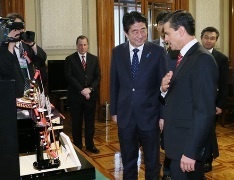 Photo: Cabinet Public Relations Office
Photo: Cabinet Public Relations Office
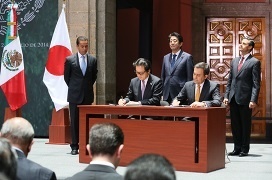 Photo: Cabinet Public Relations Office
Photo: Cabinet Public Relations Office
(A) Opening Remarks
President Peña Nieto once again welcomed the Prime Minister. The President stated that Mexico, as a friend of Japan, would never forget the bond shared between the two countries. Furthermore, the President acknowledged that three generations of Prime Minister Abe’s family had visited Mexico, The President stated that while the Japan-Mexico economic partnership agreement (EPA) had made remarkable achievements, the Prime Minister’s visit also provided an opportunity to review the agreement. The President highlighted that the two countries share a similarity in that both are pushing forward with reforms. The President commented that Japanese corporate investment in Mexico was a testament to Mexico being a reliable partner, and expressed his intention to expand Mexican investment in Japan.
Prime Minister Abe remarked that the bilateral relationship with a history of over 400 years was constantly evolving, and recalled that since the inauguration of both governments, mutual visits have taken place between the leaders, foreign ministers, and chairs of parliamentary groups. The Prime Minister noted that a visit to Mexico by Their Imperial Highnesses Prince and Princess Akishino as well as their attendance of the opening ceremony of the International Cervantes Festival in autumn were being considered. Prime Minister Abe stated that bilateral trade and investment have expanded dramatically over the decade since the signing of the Japan-Mexico EPA and with the expansion of the network of the free trade agreement (FTA) with the major markets of Mexico. Noting that many business leaders were accompanying the Prime Minister on this visit, the Prime Minister looked forward to dialogue on improving the business environment and further progress through the President’s advancement of reforms. In addition, the Prime Minister wished to expand the forum for policy dialogue in order to hold discussions on wide-ranging issues of interest to both countries.
Prime Minister went on to say that the two governments have in common the reforms being boldly undertaken in their countries, and that they are partners which have common values such as freedom and democracy, and are responsible players in the international community. The Prime Minister expressed hope that his visit would further deepen their cooperative relations.
(B) Bilateral Economic Relations
1. An overview of the Prime Minister Abe’s statements is as follows.
Both governments have proactively worked on structural reforms since their inauguration, and this has contributed to the expansion of the frontier for the further strengthening of the bilateral economic relations.
Mexico’s increased production of oil and development of shale gas was critical to the stability of the world’s energy market. It is expected that Mexico would make effective use of Japanese technologies and funding. There is a possibility that Japanese companies would engage in upstream development of oil and gas and that Mexico would supply LNG to Japan, and Japan would cooperate to this end. Japan welcomes the deepening of collaboration between Pemex and the Japanese public and private sectors.
Japan has interest in Mexico’s nuclear power program. Japan is capable of providing nuclear power technologies with heightened safety learning from the Fukushima nuclear accident. Japan would like to hold talks with Mexico regarding a nuclear power agreement.
Japan welcomes the signing of a memorandum for cooperation on further infrastructure development in Mexico. Japan would like to support SMEs and supporting industries in Mexico.
Japan hopes to collaborate with Mexico towards the swift conclusion of the Trans-Pacific Partnership (TPP). Japan would like to proceed with the fresh consultations on the bilateral EPA, taking into consideration the status of the TPP negotiations and other factors.
Japan welcomes the holding of the Second Summit of the Rectors of Japan and Mexico in October of this year, as well as the agreement on international student exchanges between The University of Tokyo and Mexico’s National Council for Science and Technology (CONACYT). The Prime Minister expressed hopes for the further promotion of exchanges.
Japan intends to build on its best practices and continue to work with Mexico in implementing triangular cooperation to contribute to the growth and development of Latin America and the Caribbean.
The Prime Minister also referred to launching a bilateral dialogue framework in the field of aerospace, and strengthened cooperation in the agricultural and health sectors.
2. President Peña Nieto responded that he agreed with the Prime Minister on the cooperation projects he referred to. The President welcomed the signing of various agreements and other documents on this day. Furthermore, the President affirmed that he shared Prime Minister Abe’s position on the importance of harnessing structural reforms for growth and the importance of re-examining their EPA.
President Peña Nieto continued to say that the expansion of Japanese companies into Mexico was a testament to Mexico being a reliable investment destination and that he was very pleased. The President added that Mexico’s issuance of samurai bonds also demonstrated trust in Mexico.
(C) Cooperation in international arenas
i. Japan’s Policy for Latin America and the Caribbean
Prime Minister Abe explained that Japan and Latin America and the Caribbean share a unique bond based on their history of friendship and cooperation. Japan wished to strengthen its partnerships with Latin America and the Caribbean which have the will to make significant contributions to the stability and prosperity of the world. The Prime Minister expressed his intention to promote exchanges which serve to develop together, contribute to the international community together, and jointly enlighten each other together.
ii. Pacific Alliance
With regard to the Pacific Alliance, Prime Minister Abe noted that while Japan had already proposed concrete cooperation, including in the areas of infrastructure development, SMEs, and disaster management, Japan hoped to hold senior working-level consultations while Mexico is the Chair of the Pacific Alliance. President Peña Nieto commended Japan’s efforts as an observer country, and expected that Japan would make many contributions to the Pacific Alliance as a platform for strengthening the relations between Latin America and the Caribbean and the Asia-Pacific region.
iii. Proactive Contribution to Peace
Prime Minister Abe explained Japan’s initiatives under its policy of “Proactive Contribution to Peace,” as well as the recent Cabinet Decision concerning matters such as PKO and the right of collective self-defense. The Prime Minister expressed Japan’s intent to strengthen collaboration between Mexico and the Asia-Pacific countries and further contribute to the peace, stability, and prosperity of the international community. President Peña Nieto praised Japan’s efforts to contribute to the peace and stability of the international community in compliance with international law.
iv. Other issues
The two leaders exchanged views on the situation in Asia, and also held broad discussions on cooperation in the international fora, including in the areas of the environment and climate change, United Nations reform, disarmament and non-proliferation, and disaster management.
4. Japan-Mexico Businessmen’s Joint Committee Meeting
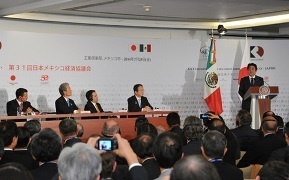 Photo: Cabinet Public Relations Office
Photo: Cabinet Public Relations Office
On Friday, July 25, Prime Minister Abe attended the 31st Japan-Mexico Businessmen’s Joint Committee Meeting at the JW Marriott Hotel in Mexico City.
This Committee Meeting was hosted jointly by Nippon Keidanren (Japan Business Federation) and the Mexican Business Council for Foreign Trade, Investment and Technology (COMCE), and it was held from 5:00 p.m. to 7:30 p.m. on the same day. A large number of representatives from both countries attended the meeting. Attending on the Japanese side were Prime Minister Abe as well as Deputy Chief Cabinet Secretary Hiroshige Seko, Senior Vice-Minister of the Cabinet Office Yasutoshi Nishimura, Nippon Keidanren Chairman Sadayuki Sakakibara, Nippon Keidanren Japan-Mexico Economic Committee Chairman Toshiyuki Shiga, among others, and attending on the Mexican side were President Peña Nieto as well as Secretary of Economy Ildefonso Guajardo Villarreal, Secretary of Communications and Transport Gerardo Ruiz Esparza, COMCE President Valentín Díez Morodo, COMCE Mexico-Japan Business Committee Chairman Enrique Zambrano, among others, and so a large number of representatives from both countries attended the meeting.
President Peña Nieto welcomed the fact that more than anything else, trust and solidarity are being encouraged thanks to the remarkable growth in the two countries’ trade and investment, and he called for deeper cooperation with Mexico, which possesses a young population and rising level of education.
Prime Minister Abe noted in his greeting that Japanese companies do not simply produce goods but they also build mutually beneficial relations including through human resources training, and that the Government of Japan has also been providing technological cooperation. The Prime Minister also stated that he would like Mexican companies to recognize the Japan’s merit, and stated that cooperation and ties in the bilateral relationship will deepen further.
5. Visit to National Museum of Anthropology
On Saturday, July 26, Prime Minister and Mrs. Abe visited the National Museum of Anthropology in Mexico City.
Prime Minister and Mrs. Abe were greeted by National Institute of Anthropology and History Director Teresa Franco, National Museum of Anthropology Director Antonio Saborit and Deputy Director Miguel Zinden Montalvo, and were guided around the Museum by Director Saborit.
Prime Minister and Mrs. Abe viewed the “Jade Mask of King Pakal,” the “Stone of the Sun (the Aztec calendar stone)” and other artifacts.
6. Visit to Teotihuacan site
 Photo: Cabinet Public Relations Office
Photo: Cabinet Public Relations Office
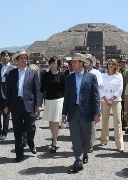 Photo: Cabinet Public Relations Office
Photo: Cabinet Public Relations Office
On Saturday, July 26, Prime Minister and Mrs. Abe visited the Teotihuacan site on the outskirts of Mexico City, one of Mexico’s representative ancient sites, accompanied by President and Mrs. Peña Nieto.
Upon arriving, Prime Minister and Mrs. Abe were greeted by Governor of the State of Mexico Eruviel Ávila Villegas, National Council for Culture and the Arts President Rafael Tovar, National Institute of Anthropology and History Director Teresa Franco and others. Furthermore, during the visit, Prime Minister and Mrs. Abe received explanations from Mr. Saburo Sugiyama, a professor at Aichi Prefectural University, who was involved in excavating the Teotihuacan site for many years.
While visiting the site Prime Minister and Mrs. Abe walked about 600 meters along the Avenue of the Dead to the Pyramid of the Sun, and then climbed the Pyramid of the Sun with President Peña Nieto.
When reached the top, President Peña Nieto told Prime Minister and Mrs. Abe that if they made a wish it would come true, and encouraged them to make a wish. They also took photographs of the views in every direction that can be seen from the Pyramid of the Sun, and President Peña Nieto himself took a photo of Prime Minister and Mrs. Abe, and in this and other ways the visit took place in an extremely relaxed atmosphere.
In the helicopter on the way back, President Peña Nieto explained Mexico City, including the places Prime Minister Abe had visited. After arriving at the Nacional Palace, Prime Minister Abe was presented with a photo album containing photographs of Prime Minister Nobusuke Kishi, Minister for Foreign Affairs Shintaro Abe and Prime Minister Abe’s present visit.
7. Meeting with executives of Japanese descent (Japan-Mexico Association members) and attendance at commemorative reception
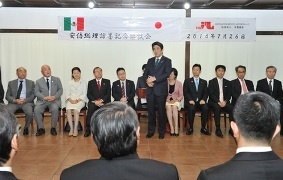 Photo: Cabinet Public Relations Office
Photo: Cabinet Public Relations Office
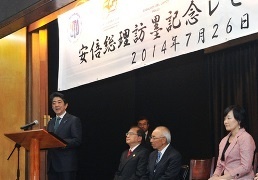 Photo: Cabinet Public Relations Office
Photo: Cabinet Public Relations Office
On Saturday, July 26, Prime Minister and Mrs. Abe attended a meeting and commemorative reception with members of the Japan-Mexico Association, an association of people of Japanese descent in the region, at the Japan-Mexico Association on the outskirts of Mexico City.
Ahead of the meeting with Japan-Mexico Association members, Prime Minister Abe placed a wreath at the Monument to the Fallen, and at the meeting, which was attended by Japan-Mexico Association officials along with Liceo Mexicano Japonés (Mexican-Japanese Lyceum) officials, members of prefectural associations of people of Japanese descent, and regional Japan-Mexico Association members, Prime Minister Abe noted in his greeting that people of Japanese descent contribute to the bilateral relationship, and expressed his hope that they will continue to serve as the most important bridge of bilateral relations.
Furthermore, the commemorative reception was held jointly by the Japan-Mexico Association, Liceo Mexicano Japonés, Japan Chamber of Commerce and Industry Mexico, the Embassy of Japan in Mexico and JETRO, and around 350 people participated. In his greeting, Prime Minister Abe mentioned the successes of people of Japanese descent, the results achieved by Liceo Mexicano Japonés, and also the outcome of the bilateral EPA, and stated that the bilateral relationship will grow stronger. The commemorative reception was held in conjunction with a “wagyu” beef promotion.
II. Evaluation
1. This was the first time in 10 years that a Japanese Prime Minister has visited Mexico in a bilateral context. The visit succeeded in demonstrating that Latin America, and Mexico in particular, is of deep interest to the Government of Japan. The Mexican side consistently emphasized that bilateral relations are based on trust, and it was possible to confirm a robust relationship of mutual trust as strategic global partners.
2. This was the third time Prime Minister Abe has held a summit meeting with President Peña Nieto, and partly because the visit was accomplished in response to repeated invitations by the other side, the meetings, visits and other events took place within an homelike atmosphere, and it contributed to enhancing a personal bond between the two leaders.
3. Japanese business leaders and the heads of Japanese universities and government institutions accompanied Prime Minster Abe. 14 documents were signed and exchanged in connection with a wide range of fields, including the economy, science, education, and science and technology. The visit provided opportunities for the breadth of the cooperative relationship between the two countries to widen dramatically in the future. In particular, it was possible to demonstrate Japan’s strong interest in the outcomes of the various reforms Mexico is pursuing, and particularly the expanded business opportunities accompanying energy reform, and to prepare the groundwork for concrete cooperation in the future. Moreover, it was possible to confirm wide-ranging cooperation in the international arena.

